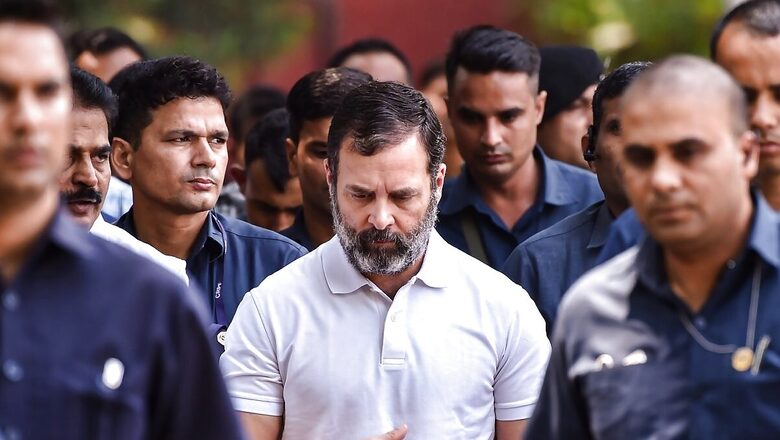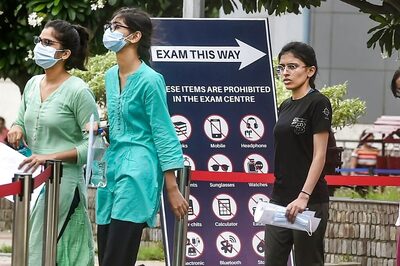
views
On March 23, 2023, Rahul Gandhi was sentenced to two years’ imprisonment in a criminal defamation case by the Surat District Court for his defamatory remark at a public rally, where he claimed that “all Modis are thieves”, thereby not only defaming PM Narendra Modi but all people with the Modi surname. ‘All Modis are thieves’ was a statement made on April 13, 2019, during the run-up to Lok Sabha elections in 2019, in Kolar near Bengaluru, Karnataka. Moot point here is, Modis are Other Backward Classes (OBCs) and with his disparaging comment, Rahul Gandhi defamed an entire backward caste and community. Rahul is a habitual offender of reckless and irresponsible politics. He attracted automatic disqualification as a Member of Parliament (MP) under Section 8 of the Representation of People’s Act 1951 read with Article 102(1)(e) of the Constitution, after being convicted for two years of imprisonment with fine.
The disqualification notification issued by Lok Sabha secretariat, after the Surat Court’s conviction, is just a reiteration of this legal position and compliance of the Court order in the matter. Hence Rahul’s acolytes, who feel he has been wronged, are wrong. The disqualification is in line with standard procedures in such cases. The Lily Thomas case of 2013 set the precedent.
The Congress party has a history of holding the judicial process in contempt. In June 1975, the Allahabad High Court convicted a member of the Nehru-Gandhi dynasty for corrupt electoral malpractices under the Representation of People’s Act. That leader was disqualified and was none other than Rahul’s grandmother, Indira Gandhi. The Congress party responded to Indira’s conviction with the biggest black spot on the Indian democracy, by imposing Emergency on June 25, 1975.
Today, Congress leaders are attacking the Surat District Court. Beyond this aggression, however, history will not repeat itself. Under PM Modi, democracy is much stronger than it has ever been as the masses love their leader who is totally dedicated to the welfare of the poor. In the words of Thirukural– “To speak ill of others is the mark of ignoble minds; for it only reveals a weakness in one’s own character.” Clearly, Rahul Gandhi’s mission was not Bharat Jodo, it was Bharat Todo. His actions are a testament to his vision of a “Tukde-Tukde Bharat.”
Rahul Gandhi constantly speaks derogatory things due to which he is facing many defamation cases. The first case of defamation against him was filed in 2014. This case is pending in Bhiwandi court of Maharashtra. A defamation case has been registered under Sections 499 and 500 of the IPC. During a speech in Bhiwandi, Rahul Gandhi accused the Sangh (RSS) of killing Mahatma Gandhi. In 2016, a defamation case was registered against him in Guwahati, Assam under Sections 499 and 500. According to the complainant, Rahul had said that Sangh members did not allow him to enter the Barpeta Satra, a 16th century Vaishnava monastery in Assam. This matter is also pending in the court. In the year 2018, another case was registered against Rahul Gandhi in Ranchi, the capital of Jharkhand. This case is pending in the court of the Sub-Divisional Judicial Magistrate of Ranchi. A defamation case of Rs 20 crore has been registered against Rahul under Sections 499 and 500 of the IPC, yet again. In this matter, an objection has been expressed to Rahul’s statement, in which he said, “Modi is a thief.” In 2018, another criminal defamation case was filed against Rahul Gandhi in Maharashtra. This case is pending in Shivadi court, located in Mazgaon. The case was filed by a worker of the Sangh. Rahul is accused of linking the murder of Gauri Lankesh with the ideology of the Bharatiya Janata Party (BJP) and the Sangh. Sushil Modi had filed a case against Rahul Gandhi in Patna also, on the statement that “all Modis are thieves.”
The then Congress President Rahul Gandhi had unconditionally apologised to the Supreme Court on April 23, 2019, for the statement “Chowkidar Chor Hai.” In the two affidavits filed earlier in the contempt case, Rahul had only expressed regret. He was reprimanded by the court on this. After this, Rahul’s lawyer Abhishek Manu Singhvi had orally apologised to the apex court. Along with this, time was sought to file a new affidavit. This clearly shows Rahul’s misguided arrogance in more ways than one.
On September 20, 2018, Rahul Gandhi said in Dungarpur, Rajasthan– “Narendra Modi had said that I do not want to become the Prime Minister of the country, I want to become the chowkidar of the country. But today, a new voice is rising, Gali gali mein shor hai, Hindustan ka chowkidar chor hai.” He kept hurling these abuses throughout the 2019 Lok Sabha elections. In a press conference in Delhi on August 5, 2022, Rahul Gandhi compared Prime Minister Narendra Modi to Hitler and termed the Modi government as a dictatorial government. On February 6, 2020, Rahul Gandhi, while targeting PM Modi in an election rally, said– “In six months, people will start beating him (Modi) with sticks.” He even called PM Modi “Jebkatra” (pick pocketer) on October 15, 2019.
“PM Modi was hiding behind the blood of jawans, doing ‘dalali’ of their sacrifice” is what Rahul Gandhi said in Delhi on October 6, 2016, during Kisan Yatra. Sonia Gandhi called Narendra Modi a “merchant of death.” During a 2007 election campaign, ex-Congress President Sonia said in Gulbarga, Karnataka on February 1, 2014— “I am sure you will not approve of people who sow seeds of poison,” referring to Modi.
Priyanka Vadra compared PM Modi with Duryodhana, on May 7, 2019, in a rally organised in support of Kumari Selja, the Congress candidate from Ambala. Rahul Gandhi had made unrestrained remarks on the then External Affairs Minister Sushma Swaraj regarding the Lalit Modi controversy. Rahul Gandhi’s role in the JNU controversy in February 2016 where he stood in support of anti-national elements who raised slogans like “Bharat tere tukde honge” is embarrassing, to say the least. In October 2017, he made derogatory remarks about the Rashtriya Swayamsevak Sangh (RSS) and women and said that he never saw women wearing shorts in RSS shakhas. “India is the rape capital of the world,” said Rahul at a public rally in 2019, in Jharkhand, showcasing how his visceral hatred for PM Modi had turned him into a reckless, loose cannon, who would stop at nothing.
The Supreme Court of India, in its judgement dated July 10, 2013, while disposing the Lily Thomas v. Union of India case (along with Lok Prahari v. Union of India), ruled that any MP, member of the legislative assembly (MLA) or member of legislative council (MLC) who is convicted of a crime and given a minimum of two years’ imprisonment, loses membership of the House with immediate effect. This was in contrast to the earlier position, wherein convicted members held on to their seats until they exhausted all judicial remedies in lower courts and the Supreme Court of India. On October 1, 2013, Rasheed Masood became the first MP to lose his membership of Parliament under the new guidelines, when he was sentenced to four years’ imprisonment for cheating, forgery and corruption.
Besides, there are a plethora of criminal defamation cases against Rahul, thanks to his deviously baseless remarks. Rahul Gandhi has also been in the eye of a storm for his anti-India remarks on foreign soil. Let us have a look at the times when he made such comments in foreign countries with zero remorse or regret.
During an interactive session at the ‘Ideas for India’ conference in London in May 2022, he said the soul of India is under attack from the BJP and “a soul without a voice means nothing and what has happened is that India’s voice has been crushed.” Gandhi alleged that India’s voice had been crushed by the institutional framework of the country itself, which was becoming parasitical. “So, the deep state, the CBI, the ED, is now chewing the Indian state and eating it, much like in Pakistan,” he claimed. This is a clear instance where Rahul did not merely criticise the BJP, which is acceptable, but undermined the credibility of India’s democratic institutions, which is certainly not acceptable. How dare he compare India’s vibrant institutional framework with Pakistan’s ISI and deep state?
During an interaction with members of the Indian community in Malaysia in 2018, he took a needless swipe at PM Modi’s decision to demonetise high-value currency notes in 2016. Rahul said– “If I was Prime Minister and someone had given me a file with demonetisation written on it, I would have thrown it in the dustbin. That is how I would have rolled it out. I would have rolled it out in the dustbin, and out through the doors and into the junkyard. Because that is what I think should have been done with demonetisation.” Why would and why should any Indian leader criticise the ruling government policy in such malignantly harsh terms on foreign soil? Is Rahul a loose cannon, looking for political relevance after leading his party into over 50 electoral defeats in over 54 small and big elections in the last nine years? Yes! But far from gaining any political relevance, he has sunk his already tired and jaded party further aground.
While speaking at a panel discussion at the Lee Kuan Yew School of Public Policy in Singapore, in March 2018, he said there was a general atmosphere of intimidation in India and the politics of dividing people was being played to win elections, once again showcasing his horrifying pettiness. While addressing a convention of NRIs in Bahrain in January 2018, his first foreign visit after taking over the reins of the Congress party, Rahul Gandhi said– “The anger is visible in the streets and is rising rapidly. The government, on the other hand, is busy converting fear into hatred between communities” in a clear sign of how this entitled dynast has used every opportunity offshore to belittle India, even at the cost of fomenting communal unrest. If anything, from the Bhagalpur and Hashimpura riots to the anti-Sikh pogrom in 1984, the Azad Maidan riots at Mumbai in 2012 and the Muzaffarnagar riots in 2013, all these took place when the Congress was in power. Hence, Rahul would do well to look at his own backyard before making wild allegations at the ruling BJP, which has indeed tirelessly worked for all, minorities included.
Rahul Gandhi took jibes at the BJP and the Narendra Modi-led government as he spoke on the issue of ‘India at 70’ at the University of California, Berkeley, in the USA in September 2017. “The idea of non-violence is under attack today, yet it is the only idea which can take humanity forward,” he said. He further added, in a classic sign of ignorance, that the Modi government was paying attention only to the top 100 companies in India. But anyone with an iota of how the economy works, knows that all through Covid, the Modi government supported India’s MSME sector, including small and micro firms, by giving them collateral free loans under the emergency credit line guarantee scheme (ECLGS).
In the last seven years, there has been a constant refrain that democracy under the Modi government has been under siege. This is the biggest lie, peddled by a vested, leftist, international press and large sections of India’s Lutyens media, that survived for decades together on the Congress party’s largesse. While nepotism and dynastic politics bereft of merit were the hallmark of the erstwhile Congress regimes, India under Prime Minister Narendra Modi has institutionalised meritocracy and development-oriented politics, with India jumping 79 places from rank 142 to rank 63 in Ease of Doing Business (EODB) ranking between 2014 and 2020, in a survey of 190 countries. Similarly, India jumped 35 places to number 46 in 2021, from rank 81 in 2014, in the Global Innovation Index (GII) ranking, from a survey of 142 countries.
Before delving deeper into what PM Modi has done, it is essential to grasp how the Congress delegitimized the democratic spirit of the country, willfully and deliberately, with impunity and precision. The fundamental rights enshrined in the Constitution of India are an integral part of India’s democratic ethos, with Article 19 of the Constitution guaranteeing the right to free speech and expression. Article 19(2) provides specific conditions under which the right to free speech can be restricted. These restrictions necessarily have to do with the sovereignty and integrity of India, the security of State, friendly relations with foreign States, public order, morality or other areas pertaining to contempt of court, defamation or incitement of an offence. The moot point to be noted here is that the right to free speech and the right to dissent are not absolute. Every freedom comes with checks and balances and Article 19 is no exception. Hence, those who hide hate speech under the pretext of exercising their rights under Article 19 are simply trying to mislead and misinform. Modi has unarguably been the most viciously trolled leader and a virulent Opposition has repeatedly attacked him personally, when they failed to take him on electorally.
In the summer of 2014, by electing Modi, the people voted decisively for honesty over dynasty. Development over decay. Security over stagnation. Opportunities over obstacles. Vikas over vote-bank politics. Indians were tired of corruption, cronyism and nepotism. The Modi mandates of 2014 and 2019 were epoch-making, also because for the first time in the history of India, a non-dynastic party was blessed with a complete majority. The Modi government works with the spirit of ‘India First’ instead of ‘Family First’, where minorities have as much say and as many opportunities as the Hindus, who are the majority and form almost 80 percent of the population. In fact, in some welfare schemes like PM Awaas Yojana, 15 percent is earmarked for minorities. Also, between 2014-2019, more than 3 crore scholarships were given to minorities, primarily Muslims and by 2024, an additional 5 crore scholarships would be handed out by the Modi government to minorities. Hence, the baseless charge that the Modi government is anti-Muslim, is just a lot of hogwash.
The Emergency declared by Indira Gandhi in 1975 made the nation a prison overnight. Even to express was to commit sin. The 42nd Amendment of 1976 put curbs on the courts and their powers relating to judicial review. It took a groundswell of public opinion to end the Emergency but the anti-constitutional mindset of those who imposed it, remained. The Congress has imposed Article 356 almost a hundred times, with Indira Gandhi herself doing so over 60 times. It was Indira Gandhi who called for a “committed judiciary”, which sought to make the courts more loyal to a family, than to the Constitution. This pursuit of a “committed judiciary” made the Congress overlook several respected judges, while appointing the Chief Justice of India.
Congress’ modus operandi was simple – reject, discredit and threaten. If a judicial verdict went against them, they rejected it, then they discredited the judge and thereafter, talked about bringing impeachment motions against the judges.
In a telling comment, former Prime Minister Rajiv Gandhi called the Planning Commission led by Dr. Manmohan Singh, “a bunch of jokers.” This comment gives you a glimpse of how pathetically the Congress treated government institutions. The NAC, an extra Constitutional body, was created by Sonia Gandhi as a body parallel to the PMO. And then, Rahul Gandhi, the hypocrite, has the cheek to talk about institutions being crushed by PM Modi? Does the Modi government have a NAC? No!
Political parties are vibrant bodies that manifest diverse public opinion. At present, Congress’ top leadership is out on bail vis-a-vis major scams. There is a famous adage – “If liberty means anything at all, it means the right to tell people what they do not want to hear.” Clearly, the Modi government has always encouraged constructive criticism and dissent, which are the bedrocks of democracy. Equally, dissent is different from descent and India’s beleaguered Opposition needs to know that by descending into the depths of a polarising narrative, it can never hope to resurrect its dwindling fortunes. “Sabka Saath, Sabka Vikas, Sabka Vishwas and Sabka Prayas” is an abiding work ethic for Prime Minister Narendra Modi and that is what makes his politics so unique and inclusive, in the true spirit of how the world’s largest democracy should run its course.
A nation can never prosper unless it reclaims its glorious past rooted in the richness and diversity of its traditions. And that is precisely what PM Modi has done. He has been unapologetic about who and what India is and rightfully so. India under Modi is not a pushover any longer on the global stage. India does not need to take lessons in inclusivity from Western theocracies or the likes of a William Dalrymple who are enslaved by their colonial mindsets. “The nation exists from us, and we exist through the nation. This realisation is becoming the biggest strength of us Indians in the making of a new India”, is a famous quote by PM Modi. Truer words have not been said, as India, the fifth largest economy globally in terms of nominal GDP, showcases to the world that growth and equity, transparency and cultural vibrancy are the essential pillars on which a ‘Modi-fied’ India is powering ahead.
Sanju Verma is an Economist, National Spokesperson of the BJP and the Bestselling Author of ‘The Modi Gambit’. Views expressed are personal.
Read all the Latest Opinions here
















Comments
0 comment